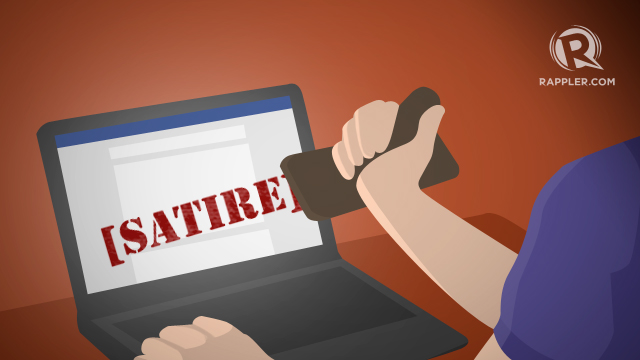SUMMARY
This is AI generated summarization, which may have errors. For context, always refer to the full article.

MANILA, Philippines – It’s become standard procedure for all netizens to throw a hissy fit whenever Facebook tries out something new, from countless Timeline and Newsfeed revamps, to forcing mobile users to download a separate Messenger app. However, these changes are admittedly part and parcel of running a tech company; it’s all about innovation, however hit and miss.
One of Facebook’s latest experiments, however, opens up a new breed of concerns.
The troublesome tag
Facebook is now placing a ‘[Satire]’ tag before articles by satirical news sites like The Onion and offshoot Clickhole. In a statement to tech blog Ars Technica, a Facebook spokesperson explained that they “are running a small test which shows the text ‘[Satire]’ in front of links to satirical articles in the related articles unit in News Feed. This is because we received feedback that people wanted a clearer way to distinguish satirical articles from others in these units.”
On the outset, this move does make sense given that mistaking satire for actual news is as common on the Internet as spouting off racial slurs. Not only will this keep readers from fully believing in something that isn’t true, but it will also prevent them from unknowingly sharing fiction as fact (and likely doing so in hysterics). Lord knows the Internet could benefit from something that nips misinformation in the bud.
The real deal
The problem is, this ends up treating satire as something that directly intends to fool people, when that is not what satire’s purpose or thrust is. Merriam-Webster defines satire as “a literary work holding up human vices and follies to ridicule or scorn,” or “wit, irony, or sarcasm used to expose and discredit vice or folly.”
Satirists don’t aim to make people think that what they’re writing is true. Instead, they aim to write pieces that exaggerate or caricaturize a person or event as a way of calling attention to their faults. For instance, if you want to make fun of a senator getting special treatment in jail, you could do a satire piece on how they complained the ball-and-chain on their ankle gave them a bad rash, because it was made of only 14-karat gold, and not 24-karat gold.
Having said that, it is crucial that a satirical piece not be preempted by a warning that it is a satirical, because reading satire entails a specific kind of experience. The power of the piece lies in how the reader is able to say to themselves, “This is ridiculous. This has to be fake. But I see how, in a more absurd or cartoonish world, this event/person could really go that far.” It’s important that the reader is able to recognize the fake-ness on their own. When they’re told of the fake-ness before they could even read the piece, that destroys the whole experience and defeats the author’s purpose.
Playing the fool
However, this presupposes that all readers are decent critical thinkers; and that all satirical pieces are well-written (and are seriously satirical, and not just fake news purposely made to fool people), and that’s what makes this issue so tricky. Admittedly, this asks for a separate essay entirely, so we won’t delve into that here. The fact remains, though, that at the root of it, Facebook’s move to label real satirical pieces does appear detrimental at worst, and insulting at best.
Is it fair for Facebook to just acquiesce to the idea that its readers are too stupid to know the difference between real news and satire? Yes, a lot of its readers mistake satire for truth. Yes, we desperately need to educate people better on how to read and discern information. But is resorting to spoon-feeding and dumbing down the way to go? Wouldn’t it be better to just let satire pieces be, and allow readers to learn as they go along, allow them to realize how they are wrong and come face to face with their lapses in logic?
Why ruin the art of satire, a clever form of writing unlike any other, just to appease the folks who couldn’t understand it? True, it helps to police misinformation better, but should this be done at the cost of rendering satire impotent, when satire is such a rich and long-standing tradition of writing and communicating that aims to point out the ills and injustices of the world? (And yes, this satire-tagging is still on a trial basis and hasn’t been implemented widely and permanently, but it’s troubling that it was even conceived in the first place.)
Common sense
Imagine a pedestrian about to cross a busy street. It is definitely important that there be walk/stop pedestrian lights to ensure that they cross at the right time. But should there also be lights that blink “look left” and then “look right” at the correct intervals as the pedestrian is actually crossing? In this world, some signs and labels are definitely necessary. But at the same time, there are also some habits that should already be built into every person, that do not necessitate guides or instructions in order to be practiced. Reading satire free of any disclaimers is one of those things we have to know how to do without any hand-holding.
We have to learn to set ourselves to a higher standard, especially when it comes to what we consume on media. Dumbing things down will only enable lazy thinking, and on platforms as innovative and forward-thinking as the ones we use on social media, won’t this be like taking two steps forward then taking three steps back? – Rappler.com
Do you agree or disagree with Facebook’s satire-tagging experiment? Share your thoughts with us in the comments section below.
Add a comment
How does this make you feel?
There are no comments yet. Add your comment to start the conversation.